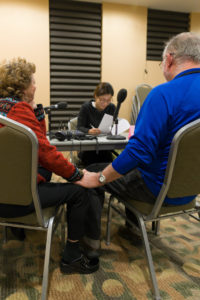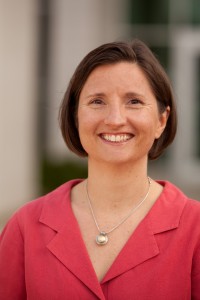A program that delivers the gift of live classical music to people with dementia has been shown to have strikingly positive effects on mood, cognitive function and relationships.
Colorado State University researchers spent nine months studying the impact of B Sharp, an arts engagement program in which people with Alzheimer’s disease and other forms of dementia attend a series of Fort Collins Symphony performances with their caregivers.

The study found that the majority of participants experienced an unexpected reversal of cognitive decline over the course of the program.
“That’s stunning for people who have a degenerative disease,” said lead researcher Jeni Cross, an associate professor in CSU’s Department of Sociology. “The best we had hoped for was to keep cognitive function flat. It actually improved for most of them.”
Collaborative effort
The B Sharp program is a collaborative effort of Colorado State University, Banner Health, Kaiser Permanente, the Fort Collins Symphony, the Larimer County Office on Aging, the Alzheimer’s Association and an area certified dementia practitioner. Participants were given season tickets to five performances and concert receptions.
The study identified several other positive effects. It was shown to improve alertness, engagement, mood, sense of community, feelings of acceptance and the interactions between caregivers and their loved ones.
“We did a lot of hand-holding and smiling during and after the performance,” one participant said. “We made eye contact throughout the entire performance, and it was like soul-traveling.”
Cross said the most interesting outcome was how B Sharp benefited caregivers, who often become isolated and lose reciprocal relationships because of their loved one’s decreasing ability to give back — and the need to ask others for help. The program gave them a sense of normalcy and a social opportunity to connect with other caregivers who were in the same situation and could empathize.
“That was the most surprising finding,” Cross said. “We knew caregivers were stressed out by the caregiving, but we didn’t realize that they were losing reciprocity and mutuality. They need to feel like they are giving and receiving.”
One caregiver said, “Other people sympathize, but nobody really understands until you get with other people that are living it. We have the bond of having a loved one with this horrible disease.”
Measuring cognition
Cross worked with Associate Professor Deana Davalos in CSU’s Department of Psychology to administer neuropsychological pre- and post-tests to measure changes in cognition. The researchers also employed the Geriatric Depression Scale as well as surveys, interviews and focus groups regarding things like mood, connectedness and support. Cross said the positive effect on participants’ mood began days before each performance, as they anticipated the upcoming concert. And even those with severe forms of dementia remembered the next day that something important had happened the night before.

“The couples found that they were creating new memories at a time when they were losing the ability to share memories of the past,” Cross said.
“It’s an opportunity for us to do something different than we normally do and to meet others in the same situation we are,” said participant Sue Squier, whose husband, Hal, was diagnosed with Alzheimer’s disease in 2008. “We think it’s important to raise awareness about Alzheimer’s disease and its impact not only on the person, but on the caregivers as well. B Sharp provides an opportunity for us both to get out of the home and have an engaging social experience. That has been really positive for both of us.”
Effects of music
Several participants said the program encouraged them to explore other activities and prompted them to play music more at home. Music therapist Lindsey Wilhelm — an assistant professor in CSU’s School of Music, Theatre and Dance — has started working with Cross to explore what effects certain kinds of music have on participants. Perhaps a customized playlist can be developed to address an individual’s anxiety, for example, while another is compiled for when the person is feeling depressed.
Cross acknowledged that the findings are preliminary, given a limited sample size, but the results are promising. She said three journal articles about the findings are in the works, and she presented the results at the Nov. 12 Music Care Conference in Toronto. Cross plans to pursue funding for further research, such as monitoring the concerts’ effect on participants’ heart rate, breathing rate, sleep patterns and immune system.
“We can say that participation showed positive effects and it’s worth continued study,” she said. “It’s been really rewarding to see the results.”
The study, conducted over the 2015-16 concert season, was made possible by a crowdfunding effort that raised $9,700 as well as financial support from Kaiser Permanente, Banner Health, Home State Bank and donors to the Fort Collins Symphony.
The Jubilate! Sacred Singers will perform at a fundraiser for B Sharp at 4 p.m. on Saturday, Dec. 3, at MacKenzie Place, 4751 Pleasant Oak Drive in Fort Collins.
The departments of Sociology and Music, Theatre and Dance are in CSU’s College of Liberal Arts; the Department of Psychology is part of the College of Natural Sciences. Cross is co-director of the Center for Energy and Behavior as well as director of research for the Institute for the Built Environment in the College of Health and Human Sciences. Davalos is the director of the Aging Clinic of the Rockies.